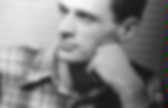

Tragedy. Tragic Elements of Arthur Miller's Death of a Salesman. Tragedy in death of a salesman. Tradgedy according to Aristotle. Realism (arts) Realism in the arts may be generally defined as the attempt to represent subject matter truthfully, without artificiality and avoiding artistic conventions, implausible, exotic and supernatural elements.
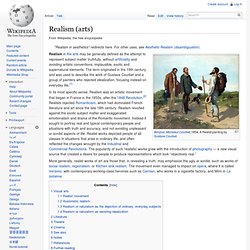
The term originated in the 19th century, and was used to describe the work of Gustave Courbet and a group of painters who rejected idealization, focusing instead on everyday life.[1] In its most specific sense, Realism was an artistic movement that began in France in the 1850s, after the 1848 Revolution.[2] Realists rejected Romanticism, which had dominated French literature and art since the late 18th century. Realism revolted against the exotic subject matter and exaggerated emotionalism and drama of the Romantic movement.
Instead it sought to portray real and typical contemporary people and situations with truth and accuracy, and not avoiding unpleasant or sordid aspects of life. The Realist movement began in the mid-19th century as a reaction to Romanticism and History painting. Henrik Ibsen. Several of his later dramas were considered scandalous to many of his era, when European theatre was expected to model strict morals of family life and propriety.
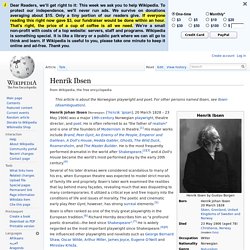
Ibsen's later work examined the realities that lay behind many façades, revealing much that was disquieting to many contemporaries. It utilized a critical eye and free inquiry into the conditions of life and issues of morality. The poetic and cinematic early play Peer Gynt, however, has strong surreal elements.[5] Ibsen is often ranked as one of the truly great playwrights in the European tradition.[6] Richard Hornby describes him as "a profound poetic dramatist—the best since Shakespeare".[7] He is widely regarded as the most important playwright since Shakespeare.[6][8] He influenced other playwrights and novelists such as George Bernard Shaw, Oscar Wilde, Arthur Miller, James Joyce, Eugene O'Neill and Miroslav Krleža.
Early life[edit] Ibsen's grandmother Hedevig Altenburg, née Paus (cf. the character Hedvig in The Wild Duck) Anton Chekhov. Anton Pavlovich Chekhov (Russian: Анто́н Па́влович Че́хов, pronounced [ɐnˈton ˈpavləvʲɪt͡ɕ ˈt͡ɕexəf]; 29 January 1860[1] – 15 July 1904)[2] was a Russian physician, dramaturge and author who is considered to be among the greatest writers of short stories in history.[3] His career as a dramatist produced four classics and his best short stories are held in high esteem by writers and critics.[4][5] Chekhov practised as a medical doctor throughout most of his literary career: "Medicine is my lawful wife", he once said, "and literature is my mistress.
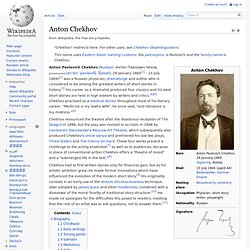
"[6] Biography[edit] Childhood[edit] Young Chekhov in 1882 Portrait of young Chekhov in country clothes Young Chekhov (left) with brother Nikolai in 1882 Chekhov family and friends in 1890. Melikhovo, now a museum Anton Chekhov in 1893 Chekhov and Olga, 1901, on their honeymoon Anton Chekhov was born on the feast day of St. Let me ask you to recall that it was despotism and lying that ruined your mother's youth. Literary realism. Anglophones[edit] George Eliot's novel Middlemarch stands as a great milestone in the realist tradition.
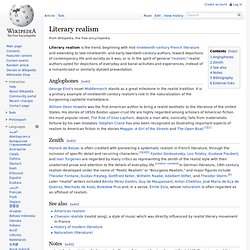
It is a primary example of nineteenth-century realism's role in the naturalization of the burgeoning capitalist marketplace. William Dean Howells was the first American author to bring a realist aesthetic to the literature of the United States. His stories of 1850s Boston upper-crust life are highly regarded among scholars of American fiction. His most popular novel, The Rise of Silas Lapham, depicts a man who, ironically, falls from materialistic fortune by his own mistakes.